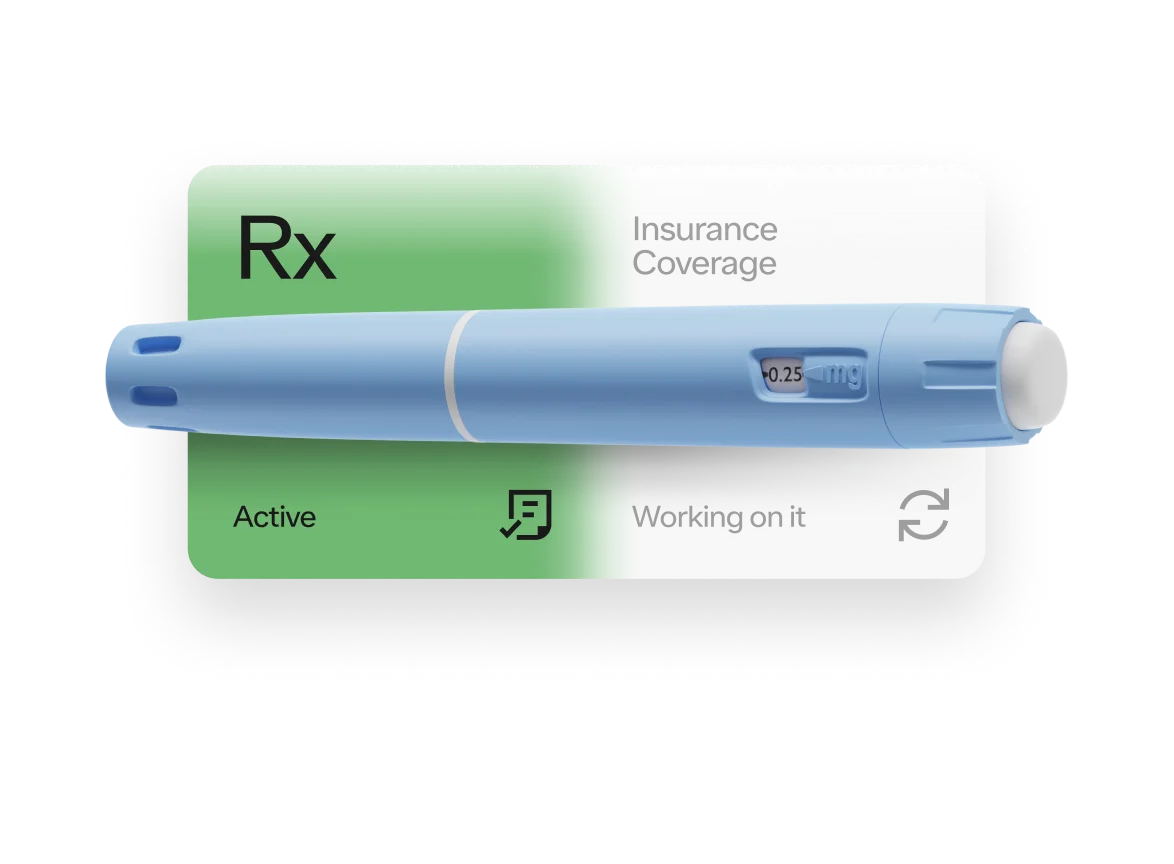Key takeaways
Ozempic is not FDA-approved to treat fatty liver disease, so most insurance plans won’t cover it for this purpose, but your provider may still prescribe Ozempic off-label for fatty liver.
Another drug called Wegovy, which contains the same active ingredient as Ozempic (semaglutide), is approved to treat metabolic-associated steatohepatitis (MASH — aka nonalcoholic steatohepatitis or “fatty liver”).
There are potential workarounds for getting Ozempic covered by insurance, including getting a prescription for an approved indication (like type 2 diabetes) or using savings programs or pharmacy coupons.
Here's what we'll cover
Here's what we'll cover
Here's what we'll cover
Key takeaways
Ozempic is not FDA-approved to treat fatty liver disease, so most insurance plans won’t cover it for this purpose, but your provider may still prescribe Ozempic off-label for fatty liver.
Another drug called Wegovy, which contains the same active ingredient as Ozempic (semaglutide), is approved to treat metabolic-associated steatohepatitis (MASH — aka nonalcoholic steatohepatitis or “fatty liver”).
There are potential workarounds for getting Ozempic covered by insurance, including getting a prescription for an approved indication (like type 2 diabetes) or using savings programs or pharmacy coupons.
Ozempic (semaglutide) has made waves for its weight loss effects and treating type 2 diabetes, heart disease, and kidney disease. According to new research, the once-weekly injection may also be able to treat fatty liver disease. If you have fatty liver disease, this exciting news may have you wondering, “Will insurance cover Ozempic for fatty liver?”
The US Food and Drug Administration (FDA) has not approved Ozempic for fatty liver, so most insurance plans are unlikely to cover it when prescribed for this purpose. However, as of August 2025, the FDA has approved Wegovy to treat fatty liver in certain people. Wegovy is another once-weekly injectable medicine that contains the same active ingredient — semaglutide — as Ozempic.
By the way, “fatty liver” is a term that describes a range of conditions, including metabolic dysfunction–associated steatotic liver disease (MASLD), formerly known as nonalcoholic fatty liver disease (NAFLD), and the more severe form, metabolic dysfunction–associated steatohepatitis (MASH), formerly called nonalcoholic steatohepatitis (NASH).
Semaglutide (under the brand name Wegovy) is specifically FDA-approved for treating MASH in adults with moderate-to-advanced fibrosis (excessive scar tissue in the liver), in combination with diet and exercise. MASH is a serious type of fatty liver disease that happens when extra fat in the liver causes inflammation and scarring.
Ozempic itself is not approved for fatty liver. That brand-specific difference can affect insurance coverage, which we break down below, along with some other ways to save on the cost of Ozempic.
Will insurance cover Ozempic for fatty liver disease?
Because Ozempic is not currently FDA-approved to treat fatty liver, insurance plans don’t cover it when it’s prescribed specifically to treat fatty liver, says Jennifer Brown, MD, ABOM, ABFM, a dual board-certified physician in obesity medicine and family medicine. So, any prescription for [Ozempic for] NAFLD or MASLD will be considered off-label.
Off-label prescribing refers to any prescription for a condition other than the one(s) specifically approved by the FDA. The practice is legal and allows providers to use their discretion in prescribing the best treatment for their patients. Ozempic is sometimes prescribed off-label to treat polycystic ovary syndrome (PCOS), as well as obesity or overweight, and now, fatty liver disease is another potential off-label treatment to add to the mix.
However, Ozempic’s active ingredient, semaglutide, is also available in Wegovy, which is FDA-approved to treat noncirrhotic metabolic dysfunction-associated steatohepatitis (MASH), formerly known as nonalcoholic steatohepatitis (NASH), in adults with moderate to advanced liver fibrosis (consistent with stages F2 to F3 fibrosis).
Insurance plans may not cover off-label prescriptions. Because of this brand-specific approval, some insurers may cover Wegovy for eligible patients with MASH but not Ozempic, even though both contain the same ingredient (semaglutide).
How to get insurance to cover Ozempic for fatty liver disease
As an off-label prescription, most insurance plans will not cover Ozempic for fatty liver disease. But, there may be some steps you can take to get it covered.
1. Review your plan
The first step to getting insurance to cover Ozempic for fatty liver disease is reviewing the details of your plan. Look up your plan documents or contact your plan administrator directly. It’s helpful to understand if Ozempic is covered at all, and if so, for which conditions.
2. Get a prescription for a covered condition
Currently, Ozempic is FDA-approved to treat three conditions:
Lowering blood sugar levels in adults with type 2 diabetes, when combined with diet and exercise
Reducing cardiovascular risk in adults with type 2 diabetes and established heart disease
Slowing the progression of kidney decline in adults with type 2 diabetes and chronic kidney disease
When insurance plans do cover Ozempic, it is usually for one of these conditions. “Many people who have fatty liver also have diabetes, and most insurance plans do cover Ozempic for the treatment of diabetes,” Dr. Brown says. That’s why she always makes sure that her patients who have type 2 diabetes as well as fatty liver are on a medication like Ozempic. In fact, up to 70% of people with diabetes also have NAFLD.
3. See if Wegovy is covered instead
If your plan doesn’t cover Ozempic, check if it covers Wegovy. Wegovy has the same active ingredient as Ozempic, and it is FDA-approved to treat fatty liver disease — as well as obesity and heart disease in adults with obesity or overweight — when combined with diet and exercise. Getting a prescription for Wegovy instead can be another insurance workaround to get treatment for fatty liver disease.
How much does Ozempic cost without insurance?
Without insurance, Ozempic costs up to $1,388.44 for a one-month supply, according to SingleCare. This retail price varies by pharmacy, and may be lower if you are eligible for any Ozempic discounts or savings programs, such as:
Ozempic Savings Offer: Offered by Novo Nordisk, the maker of Ozempic, this savings card can bring the cost of Ozempic down to $25. To be eligible, you must be prescribed Ozempic for an FDA-approved indication (such as type 2 diabetes), and have a commercial or private insurance plan that includes coverage for Ozempic. Government-funded plans such as Medicare or VA benefits are not eligible.
Novo Nordisk Patient Assistance Program (PAP): If you qualify for the Novo Nordisk PAP, you can get Ozempic for free. To qualify, you must have a total household income that is at or below 400% of the federal poverty level, and be on Medicare or have no insurance. Both Ozempic and Rybelsus, the oral form of semaglutide, are included in the PAP.
Pharmacy discount cards: Offered by websites like SingleCare, GoodRx, and others, these pharmacy-specific coupons can be used by anyone paying cash for their prescriptions. You’ll need to download the card for your specific pharmacy and dosage of Ozempic.
How can Ozempic help treat fatty liver disease?
Fatty liver disease can develop when fat builds up in your liver — a condition known as metabolic dysfunction–associated steatotic liver disease (MASLD). A more serious form, metabolic dysfunction–associated steatohepatitis (MASH), happens when the fat buildup also causes inflammation and scarring. Left untreated, MASH can lead to liver failure. Fatty liver is more common in people with weight-related health problems such as obesity, high cholesterol, and type 2 diabetes. A healthy diet and exercise routine form the basis of treatment for fatty liver disease, along with weight loss if the person has excess weight to lose.
Weight loss is considered one of the most effective ways to manage MASLD and MASH because it helps address the underlying issues — like excess fat, insulin resistance, and inflammation — that drive the disease. That’s where semaglutide comes in.
Ozempic works by slowing down digestion, which helps to balance blood sugar levels and make people feel full sooner. As a result, people tend to eat less, further preventing blood sugar spikes while also leading to weight loss. This weight loss, Dr. Brown says, can help treat fatty liver disease by directly reducing fat deposits in the liver, thereby reducing liver damage.
Indeed, various studies have shown that semaglutide can safely treat fatty liver disease by reducing fat deposits and inflammation in the liver. In one study, fat deposits improved in 70% of people within just one year. Another study found that up to 59% of people had their MASH resolve without worsening scarring after taking a low dose of semaglutide for a year and a half. In this context, “resolve” meant the liver could still contain fat, but the signs of active damage — like inflammation and injured (ballooned) liver cells — were gone.
Oral semaglutide, which is marketed as Rybelsus, may also improve fatty liver, as can Wegovy, another injectable form of semaglutide that comes in higher dosage strengths than Ozempic. In August 2025, the FDA approved Wegovy to treat MASH, also known as nonalcoholic steatohepatitis, in adults with moderate to advanced fibrosis. Wegovy’s effectiveness in treating fatty liver (and subsequent FDA approval) was based on the results of a clinical trial, which found that after 72 weeks (about a year and a half):
Wegovy resolved MASH for 63% of people taking it, without worsening of their liver scarring.
Wegovy improved liver scarring for 37% of people taking it, without worsening their MASH.
The trial will continue for a few more years so researchers can see what other benefits Wegovy may have for people with fatty liver disease, such as a decrease in mortality or the need for a liver transplant.
What to do if your insurance doesn’t cover Ozempic
With an out-of-pocket cost of nearly $1,400, Ozempic can be prohibitively expensive if your insurance doesn’t cover Ozempic. Fortunately, there are still other ways to save on Ozempic.
Compare prices at different pharmacies
Pharmacies can set their own retail price for a medication, so it’s a good idea to call around to different pharmacies in your area and see who offers Ozempic for the lowest price. You can also check with online and mail-order pharmacies. When you contact a pharmacy, ask if they offer a discounted price for longer supplies of Ozempic (purchasing two or three months of medication at a time).
Use a pharmacy coupon
Websites such as GoodRx, SingleCare, Optum Perks, and Drugs.com all offer pharmacy discount cards. Depending on the website and your pharmacy, these cards can offer significant savings on Ozempic — up to 40% off, in the case of SingleCare. To use one of these Ozempic coupon cards, you’ll need to register for free with the website, select your dosage of Ozempic, and save or print the discount card for your specific pharmacy.
Ask your healthcare provider about other treatments
Another way to save on Ozempic is to choose another medication entirely. While weight loss pills can pose some risks to people with liver problems, injectable GLP-1 drugs (like Ozempic) are generally considered safe, based on the existing research. We’ve already mentioned Wegovy (semaglutide), but there are also other weight loss injections, such as:
Zepbound (tirzepatide)
Mounjaro (tirzepatide)
Saxenda (liraglutide)
Generic liraglutide (formerly Victoza)
One or more of these may be covered by your insurance plan, which may make them more affordable than Ozempic. Almost all insurance plans cover a GLP-1 medication when prescribed for type 2 diabetes, and nearly half (43%) cover GLP-1s when prescribed for weight loss (assuming it’s an approved indication), according to research by Ro.
Other treatment options may include metformin, a diabetes medication that may be prescribed off-label for fatty liver disease. Studies show that combining metformin with semaglutide led to significantly improved liver cell function and reduced inflammation.
And, as of 2024, the first drug treatment for fatty liver was approved by the FDA. Called Rezdiffra (resmetirom), this oral medication may be covered by your insurance plan.
Bottom line
Recent research shows that semaglutide can be effective for fatty liver disease, and the FDA recently approved the brand Wegovy (semaglutide) for treating metabolic dysfunction–associated steatohepatitis (MASH) in certain adults. However, Ozempic (another brand of semaglutide) is not approved for this condition, so most insurance plans won’t cover it when it’s prescribed for fatty liver alone. That said, many people with fatty liver disease also have type 2 diabetes — a condition for which Ozempic is FDA-approved. If that’s the case, your insurance may cover it under a diabetes-related diagnosis.
Check the details of your insurance plan. Review your insurance coverage to see if Ozempic (or Wegovy) is included and for what conditions.
Talk to your healthcare provider. If you have a covered condition like type 2 diabetes, your provider may be able to prescribe Ozempic in a way that’s eligible for insurance coverage. If your insurance covers Wegovy instead, you may be covered if it’s prescribed to treat obesity, heart disease with obesity, or fatty liver disease.
Prior authorization is usually required. Your provider can submit documentation showing Ozempic is a medically necessary treatment for you.
Use pharmacy discount cards. If you’re paying for Ozempic out-of-pocket, savings offers and pharmacy coupons can significantly reduce the cost of your monthly refill.
Consider alternatives. Newly approved treatments like Wegovy or Rezdiffra may be covered by your plan for fatty liver, even if Ozempic is not.
Frequently asked questions (FAQs)
Can Ozempic be prescribed for fatty liver?
While Ozempic can be prescribed off-label for fatty liver, it is not FDA-approved to treat fatty liver disease. That means most insurance plans will not cover it, unless your healthcare provider prescribes Ozempic for an FDA-approved indication, such as type 2 diabetes.
What conditions qualify for Ozempic?
Currently, Ozempic is FDA-approved to treat three conditions: lowering blood sugar levels in adults with type 2 diabetes, reducing cardiovascular risk in adults with type 2 diabetes and heart disease, and slowing the progression of chronic kidney disease (CKD) in adults with type 2 diabetes and CKD. While Ozempic may be prescribed off-label for other conditions — such as obesity, polycystic ovary syndrome (PCOS), or fatty liver disease — it is not specifically approved to treat those conditions.
Does Medicare cover Ozempic for fatty liver?
No, Medicare probably won’t cover Ozempic for fatty liver, since the FDA has not approved Ozempic to treat fatty liver disease. Medicare generally only covers drugs for their FDA-approved indications. In the case of Ozempic, that includes type 2 diabetes as well as kidney or heart disease in the presence of type 2 diabetes.
DISCLAIMER
If you have any medical questions or concerns, please talk to your healthcare provider. The articles on Health Guide are underpinned by peer-reviewed research and information drawn from medical societies and governmental agencies. However, they are not a substitute for professional medical advice, diagnosis, or treatment.
Ozempic Important Safety Information: Read more about serious warnings and safety info.
Wegovy Important Safety Information: Read more about serious warnings and safety info.
GLP-1 Important Safety Information: Read more about serious warnings and safety info.
Zepbound Important Safety Information: Read more about serious warnings and safety info.
Mounjaro Important Safety Information: Read more about serious warnings and safety info.
Saxenda Important Safety Information: Read more about serious warnings and safety info.
References
Bandyopadhyay, S., Das, S., Samajdar, S. S., et al. (2023). Role of semaglutide in the treatment of nonalcoholic fatty liver disease or non-alcoholic steatohepatitis: A systematic review and meta-analysis. Diabetes & Metabolic Syndrome Clinical Research & Reviews, 17(10), 102849. doi: 10.1016/j.dsx.2023.102849. Retrieved from https://www.sciencedirect.com/science/article/pii/S1871402123001455?via%3Dihub
Gad, A. I., Ibrahim, N. F., Almadani, N., et al. (2024). Therapeutic Effects of Semaglutide on Nonalcoholic Fatty Liver Disease with Type 2 Diabetes Mellitus and Obesity: An Open-Label Controlled Trial. Diseases, 12(8), 186. doi: 10.3390/diseases12080186. Retrieved from https://pmc.ncbi.nlm.nih.gov/articles/PMC11354027/
Koureta, E. & Cholongitas, E. (2024). Evolving role of semaglutide in NAFLD: in combination, weekly and oral administration. Frontiers in Pharmacology, 15. doi: 10.3389/fphar.2024.1343587. Retrieved from https://pmc.ncbi.nlm.nih.gov/articles/PMC10920271/
Nevola, R., Epifani, R., Imbriani, S., et al. (2023). GLP-1 Receptor Agonists in Non-Alcoholic Fatty Liver Disease: Current evidence and Future Perspectives. International Journal of Molecular Sciences, 24(2), 1703. doi: 10.3390/ijms24021703. Retrieved from https://www.mdpi.com/1422-0067/24/2/1703
Newsome, P. N., Buchholtz, K., Cusi, K., et al. (2020). A Placebo-Controlled trial of subcutaneous semaglutide in nonalcoholic steatohepatitis. New England Journal of Medicine, 384(12), 1113–1124. doi: 10.1056/nejmoa2028395. Retrieved from https://www.nejm.org/doi/full/10.1056/NEJMoa2028395
NovoCare-a. (2024). Patient Assistance Program. Novo Nordisk. Retrieved from https://www.novocare.com/diabetes/help-with-costs/pap.html
NovoCare-b. (2024). Request or activate your Ozempic® Savings Offer. Novo Nordisk. Retrieved from https://www.novocare.com/diabetes/products/ozempic/savings-offer.html
SingleCare. (2025). Ozempic Coupons & Prices. Retrieved from https://www.singlecare.com/prescription/ozempic
Ren, R., Pei, Y., Kong, L., et al. (2024). The effect of semaglutide combined with metformin on liver inflammation and pancreatic beta-cell function in patients with type 2 diabetes and non-alcoholic fatty liver disease. Journal of Diabetes and Its Complications, 39(2), 108932. doi: 10.1016/j.jdiacomp.2024.108932. Retrieved from https://pubmed.ncbi.nlm.nih.gov/39700591/
Rinella, M. E., Neuschwander-Tetri, B. A., Siddiqui, M. S., et al. (2023). AASLD Practice Guidance on the clinical assessment and management of nonalcoholic fatty liver disease. Hepatology, 77(5), 1797–1835. doi: 10.1097/hep.0000000000000323. Retrieved from https://journals.lww.com/hep/Fulltext/2023/05000/AASLD_Practice_Guidance_on_the_clinical_assessment.31.aspx
Sanyal, A. J., Newsome, P. N., Kliers, I., et al. (2025). Phase 3 trial of semaglutide in Metabolic Dysfunction–Associated steatohepatitis. New England Journal of Medicine, 392,(21), 2089-2099. doi: 10.1056/nejmoa2413258. Retrieved from https://pubmed.ncbi.nlm.nih.gov/40305708/
U.S. Food and Drug Administration (FDA-a). (2025). FDA Approves Treatment for Serious Liver Disease Known as ‘MASH’. Retrieved from https://www.fda.gov/drugs/news-events-human-drugs/fda-approves-treatment-serious-liver-disease-known-mash
U.S. Food and Drug Administration (FDA-b). (2025). Highlights of Prescribing Information: Ozempic (semaglutide) injection, for subcutaneous use. Retrieved from https://www.accessdata.fda.gov/drugsatfda_docs/label/2025/209637s025lbl.pdf
U.S. Food and Drug Administration (FDA-a). (2024). Highlights of Prescribing Information: Rezdiffra (resmetirom) tablets, for oral use. Retrieved from https://www.accessdata.fda.gov/drugsatfda_docs/label/2024/217785s000lbl.pdf
U.S. Food and Drug Administration (FDA-c). (2025). Highlights of Prescribing Information: Wegovy (semaglutide) injection, for subcutaneous use. Retrieved from https://www.accessdata.fda.gov/drugsatfda_docs/label/2025/215256s024lbl.pdf
Volpe, S., Lisco, G., Fanelli, M., et al. (2022). Once-Weekly Subcutaneous Semaglutide Improves Fatty Liver Disease in Patients with Type 2 Diabetes: A 52-Week Prospective Real-Life Study. Nutrients, 14(21), 4673. doi: 10.3390/nu14214673. Retrieved from https://pmc.ncbi.nlm.nih.gov/articles/PMC9657108/
Zhu, K., Kakkar, R., Chahal, D., et al. (2023). Efficacy and safety of semaglutide in non-alcoholic fatty liver disease. World Journal of Gastroenterology, 29(37), 5327–5338. doi: 10.3748/wjg.v29.i37.5327. Retrieved from https://pmc.ncbi.nlm.nih.gov/articles/PMC10600803/














